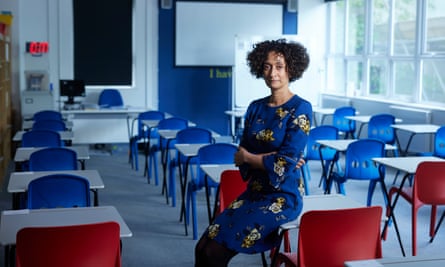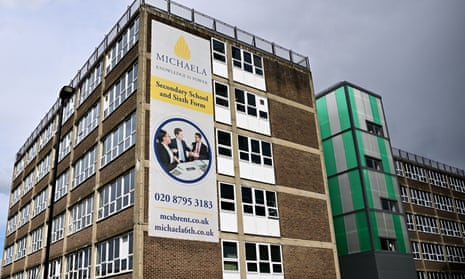It was in year nine when Hanzla started praying in the playground during lunchtime at his secondary school in Birmingham, despite restrictions from his teachers.
“I’d find anywhere in the playground and get my friends to kind of make a circle around me – those friends were Muslims and non-Muslims – so the teachers would not find out,” he said. “A lot of the time it used to be raining and sometimes even snowing and the weather was cold.”
Hanzla, now a 20-year-old university student, said he began praying at the school the year before in the classroom of a Muslim teacher. However, once other members of staff became aware, Hanzla said this was later “banned”, leading him to take his prayer to the playground.
“Normally we tried to find a quiet corner on the playground so in between buildings or in the corner of the playground,” he said. “My prayer mat was getting soaked and muddy because obviously it would have been raining that day so I used to come home and say: look it’s all drenched. It was, almost, a very stressful situation because every lunch break I’d have to try [to] find a place to pray when I would not get caught.”
In April, a Muslim student lost her legal challenge against the Michaela community school in north-west London after its founder, thought to be Britain’s strictest headteacher, introduced a prayer ban.

The student argued the ban was discriminatory but the head, Katharine Birbalsingh, claimed the prayers undermined social cohesion and inclusion, contributing to “segregation between religious groups and intimidation within the group of Muslim pupils”, the court was told.
Mr Justice Linden, in his 83-page written judgment for the high court, ruled in favour of Birbalsingh and said the prayer ban was a “proportionate means of achieving the legitimate aims” of the school, adding: “The claimant at the very least impliedly accepted, when she enrolled at the school, that she would be subject to restrictions on her ability to manifest her religion.”
For Hanzla, who was told he could face detention due to his prayer rituals at school, the recent legal challenge was a potent reminder of his own experience. “I was quite shocked,” he said. “I would assume that the girl should have won the case.”
There is no legal requirement for schools in the UK to allow pupils time or a place to pray, with some schools making provisions for this and others not.
Prayers are one of the five pillars of Islam and Muslims are required to perform the prayers at specific times during the day. For most Muslim pupils, afternoon prayers coincide with school hours during the winter months.
Muddathir Quraishi, an 18-year-old sixth form student at the Altrincham grammar school for boys, explained how his school’s Islamic society has facilitated space for Muslim students to participate in a 15-minute prayer at lunchtime.
“As Muslims it’s a spiritual experience, praying within congregation with people that I know, and when you pray it makes you feel better,” he said. “It’s made me feel more included in my school, the Islamic society is not only a society in my eyes. I see it more as a community.”
Quraishi and his mother, Saima Alvi, who is the vice-chair of the British Muslim Heritage Centre in Manchester, said the school’s policy around prayer had greatly influenced his decision to join the school.
“The main two important aspects of my life are my religion and my academics,” Quraishi said. “That’s what I was focusing on especially when joining the secondary school.”
Responding to the ruling in thehigh court, Saima said: “British values, two of them are tolerance and mutual respect. Where’s the tolerance and mutual respect when you’re not allowing people to perform a mandatory duty that’s in their lunchtime, that’s not affecting anybody? I just can’t understand any logic in that.”

Birbalsingh wrote the Michaela community school expects “all religions and all races to make the necessary sacrifices to enable our school to thrive. The vast majority do so without complaint”, in a statement released after the ruling.
The founder added half of the school’s intake is Muslim and emphasised: “If our families did not like the school, they would not repeatedly choose to send their children to Michaela.”
Bushra Nasir CBE, one of Britain’s first female Muslim headteachers, said she had introduced a multi-faith prayer room at the Plashet secondary school for girls in Newham, east London, in 1993, which was well received by staff, parents and pupils.
“It came from the student council, they wanted a prayer room. We spoke to staff, we found a very nice area in the school that was quite near washing facilities … and it was very well used.”
Nasir said the prayer room provided children with a “sense of belonging”, adding: “You don’t have to leave your identity at the door. You’re bringing your whole self.”
Reacting to the ruling at the Michaela school, Nasir said: “I was really saddened, I just felt that the progress that schools have made over the years to be inclusive, to meet the needs of students from all faiths and none, actually has been undermined by this.”
The student who brought forward the legal challenge said in a statement that she was “disappointed” by the outcome at the high court, adding: “As is set out in the judgment, I do not agree that it would be too hard for the school to accommodate pupils who wished to pray in the lunch break.”
Birbalsingh, however, said the ruling was a “victory for all schools”, adding any educational institution “should be free to do what is right for the pupils it serves”.
